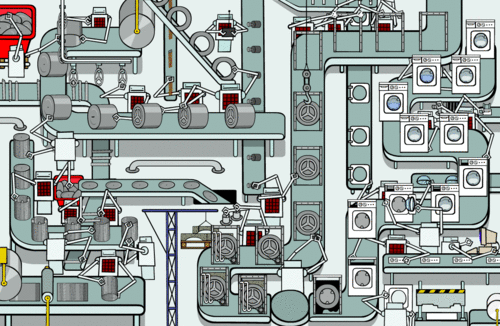


04/18/2019
There are two great social changes occurring on the planet now that are not getting the public debate they deserve — one is automation with its associated massive job loss, and the other is population growth in the Third World.
Regarding the latter, it is routinely overlooked in the current media coverage of the thousands of illegal aliens crossing America’s open border daily. We hear some about the pull factor of US jobs and free stuff, but the push factor of basic poverty combined with huge population growth looms large: for example, backward Honduras has quadrupled its human numbers since 1960.
Plus, automation upsetting fragile developing economies in the Third World only worsens the other stresses. The World Bank warned in 2017 that smart machines will likely slash employment and increase instability in developing countries. Certainly, automation-caused job loss increases the desire of residents to migrate to the nearest industrialized nation to grab any available employment.
Indeed, an Al-Jazeera article headlined last fall: Undeterred caravan migrants: ‘All of Honduras wants to come here’
Below, Honduran caravan invaders carry their flag to show their allegiance.

The United States has a decent jobs economy now which is attractive to the masses from down south, but we can expect a rapid rollout of robots when the next downturn occurs, as has happened before.

So Americans won’t need newbie workers from Central America whose skills are more appropriate for an earlier century.
Below is the BBC report. It also includes a 53-minute audio documentary located at this link.
Will AI kill developing world growth?, BBC News, April 18, 2019
Artificial intelligence (AI) could displace millions of jobs in the future, damaging growth in developing regions such as Africa, says Ian Goldin, professor of globalisation and development at Oxford University.
I have spent my career in international development, and in recent years have established a research group at Oxford University looking at the impact of disruptive technologies on developing economies.
Perhaps the most important question we have looked at is whether AI will pose a threat — or provide new opportunities — for developing regions such as Africa.
Optimists say that such places could use rapidly advancing AI systems to boost productivity and leapfrog ahead.
But I am becoming increasingly concerned that AI will, in fact, block the traditional growth path by replacing low-wage jobs with robots.
As Kai-Fu Lee, a Beijing-based venture capitalist who invests in artificial intelligence, tells us, AI is potentially the most revolutionary technology to emerge this century. It is also, along with the associated technologies of machine learning and robotics, advancing at breakneck speed.
Already AI has the capacity to replace many work tasks that are rules-based and repetitive, and which do not require great dexterity or empathy.
In developed economies, for instance, robots have replaced well over half of the jobs in the car and related industries in recent decades.
Automated systems are already getting higher customer satisfaction ratings than people in call centres, threatening a key source of jobs in many countries.
Similarly, AI enabled systems are leading to significant job losses in back-office administrative functions in banking, health, insurance and accounting. These are roles that had in recent years been outsourced to developing countries such as India, Vietnam, South Africa and Morocco.
Jobs at risk?
According to our research at Oxford, about 40% of jobs in Europe are vulnerable to AI over the coming decades, almost half of jobs in the USA, and an even greater share in developing countries.
Some argue that AI will create as many new jobs as those lost to robots, and that we shouldn’t worry too much. But I believe that those new jobs will be concentrated in certain parts of the developed world, and that the developing world will miss out. (Continues)